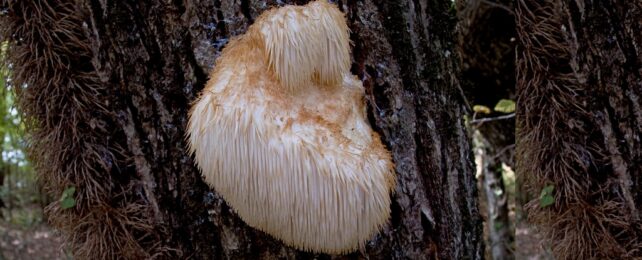Fungi have attracted attention in recent years for their potential in aiding our brains' growth and functionality. And no, we're not just talking about the psychedelic ones.
The lion's mane mushroom, for one, has long had a reputation for various mental health benefits, with recent research supporting its potential in reducing risk for depression or limiting damage from Alzheimer's disease.
In a new study conducted by an international team of scientists, researchers identified compounds in the lion's mane mushroom (Hericium erinaceus) – an edible fungus species also known as yamabushitake or hou tou gu – that could boost nerve growth and enhance memory.
"Extracts from these so-called lion's mane mushrooms have been used in traditional medicine in Asian countries for centuries, but we wanted to scientifically determine their potential effect on brain cells," says lead author Frédéric Meunier from the Queensland Brain Institute.
The researchers isolated a compound from the lion's mane mushroom known as N-de phenylethyl isohericerin, along with its hydrophobic derivative called hericene A, and tested their effects on cultured neurons from rat embryos.
The extracts had a "clear neurotrophic effect," they write, resulting in doubly long axons – the threadlike links that conduct impulses away from a neuron – and more than triple the number of neurites, or small projections from a neuron that can grow into fully functional axons or dendrites.
"Laboratory tests measured the neurotrophic effects of compounds isolated from Hericium erinaceus on cultured brain cells, and surprisingly we found that the active compounds promote neuron projections, extending and connecting to other neurons," Meunier says.
"Using super-resolution microscopy, we found the mushroom extract and its active components largely increase the size of growth cones," he adds, "which are particularly important for brain cells to sense their environment and establish new connections with other neurons in the brain."
Research has shown growth cones drive the development of axons, helping these crucial extensions branch out from one nerve cell and navigate to connect with a precise target cell.
The study also featured behavioral experiments on mice, designed to test how the fungal compounds affect the rodents' memory. The results suggest "dietary supplementation with H. erinaceus crude extract significantly enhanced recognition memory."
And apparently it doesn't take much to get this result – reducing concentrations of hericene A by a factor of 50 in the crude extract didn't seem to affect its influence over recognition memory.
Previous research on lion's mane mushrooms suggested their famous memory-boosting effect might occur because they promote neurogenesis, the researchers note, and this study seems to support that explanation.
"Our idea was to identify bioactive compounds from natural sources that could reach the brain and regulate the growth of neurons, resulting in improved memory formation," says co-author Ramon Martinez-Marmol, a research fellow with the Queensland Brain Institute.
Lion's mane mushrooms form white, shaggy spines that dangle in a cluster, vaguely resembling a beard or a lion's mane. They grow naturally on dead trees, with a native range spanning swaths of Asia, Europe, and North America, but are also widely cultivated.
The fungus has a long history in traditional Chinese medicine, and a growing field of research is now validating some of the centuries-old claims of its health benefits. This study may reveal valuable details, but we also still have a lot to learn about what exactly these mushrooms can do.
Like many studies so far, this one relies on rodents to examine how the mushroom affects brain cells and function. That can yield useful insights, of course, but more research involving humans will be needed before scientists fully understand how the compounds affect our species.
In the meantime, this new study lends intriguing support to the already strong case that lion's mane mushrooms offer at least some kind of brain-boosting effects. Overall, the authors write, their findings suggest the compound hericene A acts as a "potent memory enhancer."
According to Dae Hee Lee from CNG Bio, a South Korea-based company that supported the research, this sheds new scientific light on an ancient tradition. And these insights could be especially relevant today, as many aging human populations contend with cognitive decline.
"This important research is unraveling the molecular mechanism of lion's mane mushroom compounds and their effects on brain function, particularly memory," Lee says.
The study was published in the Journal of Neurochemistry.
